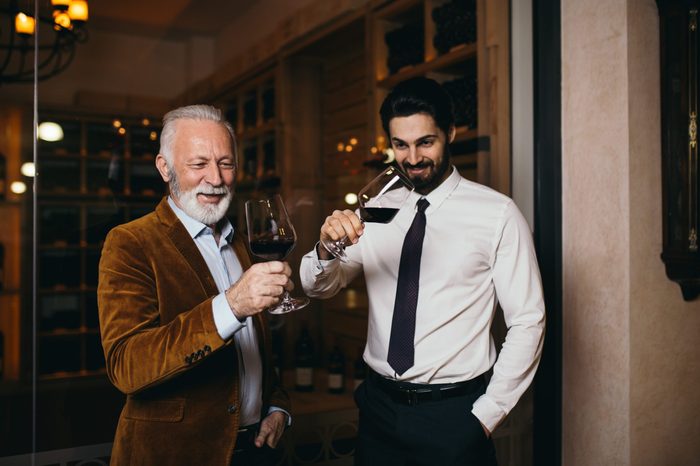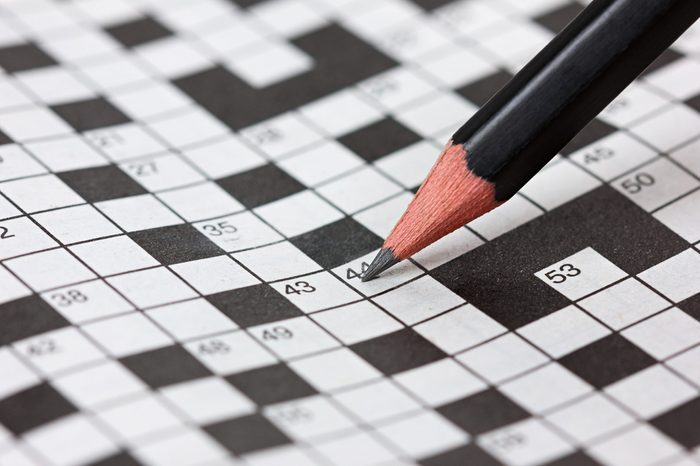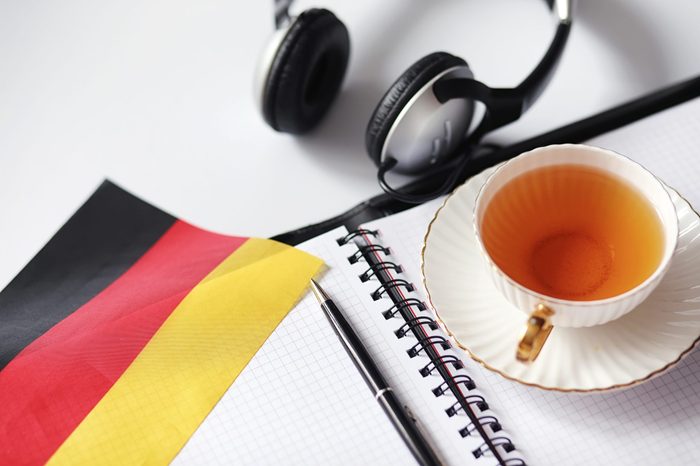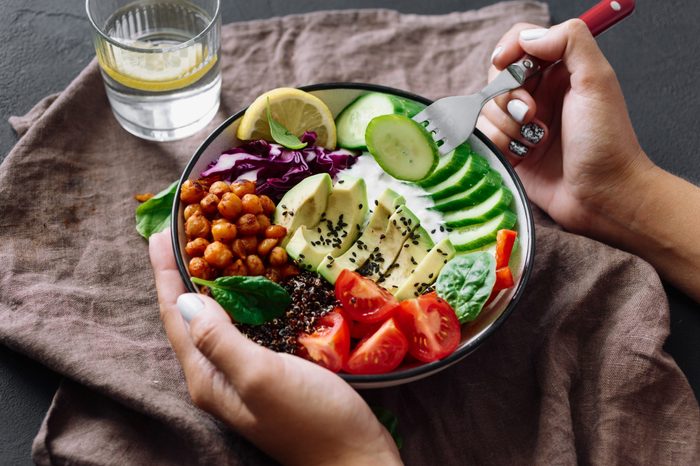
Take charge of your brain health
Every day you take dozens of small steps to keep your body healthy: drinking water to stay hydrated, eating a balanced diet, exercising, brushing your teeth, taking the medications your doctor prescribes, getting enough sleep, etc. On their own, each of these mini moves has a tiny impact. Together, they lead to big results—and a longer, healthier life.
Brain health is no different. “The way we use our brains, day-to-day, matters, and the habits that we form in the way we use our brains matters,” says Jennifer Zientz, MS, head of clinical services with the Center for Brain Health at the University of Texas at Dallas. Daily lifestyle and diet tweaks, can, over time, help ward off cognitive decline, boost creativity, and keep conditions like depression at bay. And, says Zientz, “you’re never too young or too old to get started.”

No more multitasking
If you’re reading this while streaming a TV show and writing a note to your partner, you might want to stop. Contrary to popular belief, people are less efficient—not more—when they multitask. Your brain can only do one thing at a time, says Zientz. “When you multitask, you force it to bounce back and forth, which causes a great deal of stress on the brain.” Cortisol levels rise, and too much of the hormone is toxic to neural function.
Plus, “you never fully complete anything, and completion and sense of accomplishment provides a dopamine reward,” says Zientz. (Dopamine is a neurotransmitter linked to feelings of happiness.) “Multitasking has also been linked to atrophy in the hippocampus, the memory and learning center of your brain.”

Play games
Certain types of games could give you—and your kids—a mental boost. Gamers who played the physics-based puzzle game Cut the Rope improved concentration, task-switching skills, and adapting to new situations more than those who played other types of video games, according to a study from Nanyang Technological University in Singapore. Researchers suggest complex brainteasers, which involve planning and readjusting strategies, might help improve memory. Try these apps to keep your brain engaged.

Keep stress in check
Go-to stress soothers like a daily walk around the block, a weekly massage, and relaxing with a magazine may keep your brain healthy down the road. Long-term stress can spike levels of the stress hormone cortisol, which wears away at the short-term memory regions of the brain, according to a University of Iowa study. Here’s how to cope with stress.

Drink red wine
Popular studies have linked red wine to a healthy heart; now a German study suggests it might help your brain, too. Researchers found that people who increased their intake of resveratrol, an antioxidant found in red wine, blueberries, and dark chocolate, improved their abilities to form new memories. Those who consumed 200 mg per day of resveratrol instead of a placebo for about six months were able to memorize more words over a 30-minute delay than they could before they started taking the capsules. The study found that those who’d taken resveratrol had changes in their hippocampus—the area of the brain most involved in memory—that helped neurons work together, which was linked to better cognitive performance. While a glass of red wine contains far less resveratrol than in the study, the researchers believe that, based on previous research, even these trace amounts could have positive effects on memory and brain health.

Cut back on sugar
Diets rich in sugar and other simple carbs could drain your brain, according to a Charité University Medical Centre study. The researchers found that even among healthy people without diabetes or glucose intolerance, those with lower blood sugar levels, as measured through blood tests, performed better on tests measuring how many words participants could memorize after a 30-minute delay. Learn the foods to eat for better memory.

Get the sleep you need
Many studies have shown a connection between learning and sleep, but a study from New York University School of Medicine and Peking University Shenzhen Graduate School shows why this might be. Studying mice, researchers found that during slow-wave sleep the brain replays activities from the day, helping commit the events to memory. Forming new memories is difficult without sleep, according to the study. What’s more, a study from the Washington University School of Medicine found that people who woke up often during the night were five times more likely than those who had more restful sleep to have build-ups of amyloid plaque, which are characteristic of Alzheimer’s disease. It’s unclear whether the disrupted sleep causes dementia or whether Alzheimer’s-related brain changes alter sleep patterns, but it couldn’t hurt to get more sleep. Use these simple daily tasks to sharpen your memory and boost your brain health.

Pop ibuprofen for pain
Animal research from Newcastle University in England suggests that ibuprofen might reduce dementia risk by reducing inflammation. Mice that were genetically prone to inflammation aged twice as fast as other mice. They had more heart problems, gray hair, weight loss, and unsteady feet, researchers found. But when scientists pumped them with ibuprofen, the premature aging stopped, suggesting that inflammation might drive aging, rather than the other way around. However, ibuprofen had no effect on mice that weren’t at risk for inflammation. Researchers warn against taking ibuprofen solely as a condition against dementia, as the drug can raise the risk of heart attack and stroke when used long term.

Mix up your exercise
Women with mild cognitive impairment who walked or lifted weights improved their memories after six months, but those who only stretched and toned had worse memories than when they started, according to a study in The Journal of Aging Research. Both walking and lifting weights improved participants’ spatial memory, the type of memory that helps us remember our environment—such as the layout of a room, or where you put your keys—but those who got their exercise from walking had greater gains in verbal memory. Bottom line: Different types of exercises have different mental benefits, so try to get both endurance and weight training into your routine. (Check out why cardio is so important.)

Learn an instrument
Take up trombone lessons or tickle the ivories. A study published in the Journal of Neuroscience found that learning to play a musical instrument changes brain waves in a way that boosts your listening and hearing skills over a short period of time. This change in brain activity may help you retain listening skills and ward off age-related cognitive declines. Now that’s music to our ears.

Bust a move
A recent study published in the Journal of the American Geriatrics Society found that people who participated in physical activities, like dance, that required being mindful had stronger cognitive function than those who didn’t take part in these activities. Researchers even found that a weekly hour of dance improved the brains of those who were already having memory troubles.

Hit the mat
Inner calm isn’t the only perk to be gained by taking a yoga class, according to a team of UCLA neuroscientists. They discovered people who practiced Kundalini yoga and meditation for three months had a reduction in the cognitive and issues that often precede Alzheimer’s disease and other forms of dementia. In fact, yoga was found to be even more effective than traditional memory enhancement exercises.

Throw a dinner party
Time to break out your best recipes: Recent research from Canada’s University of Alberta found that social activities like hosting a dinner get-together may help stave off memory loss in people over 55 years old. The benefit wasn’t limited to better brain power. Those between the ages of 55 and 75 with good memories also tended to have a lower heart rate and fewer depressive symptoms.

Do the crossword
Two recent papers published in the International Journal of Geriatric Psychiatry found that the more regularly adults aged 50 and older played mentally engaging word and number games such as crosswords puzzles and Sudoku, the better their brain function was in areas including memory, attention, and reasoning. On measures of problem-solving, puzzle-solvers performed equivalent to an average of eight years younger compared to those who didn’t.

Take a nap
A 45- to 60-minute power nap could improve learning and memory by fivefold according to a recent study. German researchers asked people to learn word pairs from a list and tested them on their powers of recall. Then, half the group took a snooze while researchers measured their brain activity (specifically “sleep spindles”—a burst of activity in the hippocampus that is involved in memory consolidation), while the rest of the people watched a DVD. When they retested how well people could remember the word pairs, the nappers did approximately five times better.

Do your chores
Weeding the rose beds or collecting the mail might seem like little more than tasks to tick off your to-do list, a new study in the Journal of Gerontology has found that older adults who do these active chores have more gray matter— the part of the brain linked to memory, emotions, speech, decision-making and self-control. “More gray matter is associated with better cognitive function, while decreases in gray matter are associated with Alzheimer’s disease and other related dementias,” said Shannon Halloway, PhD, the lead author of the study, told Alzheimer’s news site beingpatient.com.

Doodle or color
Bored in a meeting? Discreetly drawing a few stick figures on the edges of your notebook could actually help you come up with an idea that’ll blow your boss’s socks off. Recent research shows doodling and coloring increases blood flow to the prefrontal cortex, the part of the brain involved in problem-solving, logic, attention and memory—and keeping. What’s more, people who doodled felt more creative, full of good ideas, and more capable of solving problems.

Get it on
Australian researchers found that middle-aged couples who have regular romps between the sheets perform better on memory tests, according to a study in the journal the Archives of Sexual Behaviour. The study authors suspect intimacy may boost memory by stimulating areas of the hippocampus, the part of the brain linked to recall.
The catch? Sexual activity only seemed to help with short-term memory tasks; it didn’t seem to prevent memory decline in the long run. Still, if you’re looking for an outside-the-box way to stop forgetting where you put your keys, run this idea past your partner. If they need more convincing (unlikely!) share these other benefits of sex.

Turn up the thermostat
A new study in PLOS One found that women performed better on math and verbal tests in higher temperatures. Men performed best in cooler rooms, though temperatures didn’t impact them as much. “Our findings suggest that gender mixed workplaces may be able to increase productivity by setting the thermostat higher than current standards.” Here, here!

Learn a second language
Being bilingual is linked to a healthier brain structure, according to a study conducted by researchers at Concordia University in Montreal, Canada. The scientists used MRI scans to measure the brains of people who cognitive impairment. What they found: The brains of people who were fluent in more than one tongue were thicker and denser in areas that control language, cognition, and memory. The study authors noted that speaking two languages may not prevent Alzheimer’s but it may help build up a cognitive reserve that can slow down the onset of the disease’s symptoms.

Follow the Mediterranean diet
A traditional Mediterranean diet (loads of fresh fruits and veggies, healthy fats like olive oil, whole grains, legumes, nuts, and fish; moderate amounts of red wine; limited red meat) may improve brain health. A study from the journal Neurology showed that older people who closely followed a Mediterranean-style diet retained more brain volume during a three-year period than those who didn’t follow the diet quite as closely. Researchers have linked a decrease of brain volume and brain cells to memory deficits and the development of neurological disorders including dementia. And don’t forget to grab this secret ingredient you need for the Mediterranean diet.

Eat dark chocolate
The sweet treat could make you smarter. One recent study revealed that a flavanol found in cocoa produces positive cognitive benefits—especially in tasks involving memory, executive function, and processing speed in older adults. Previous research has linked cocoa flavanoids to enhanced cognition, attention, and working memory.

Learn something new
Seniors who spent 12 weeks learning to use an iPad and various apps better remembered daily events and how to perform simple tasks than those in other groups who did activities that didn’t involve learning new skills, such as watching movies or socializing with others, according to a study in the journal The Gerontologist. Researchers believe it wasn’t just using the tablets that improved participants’ thinking, but the process of actively learning something new. Try it yourself instead of sticking with what you already know.
Next, check out these brain help tips that’ll help keep you young.
